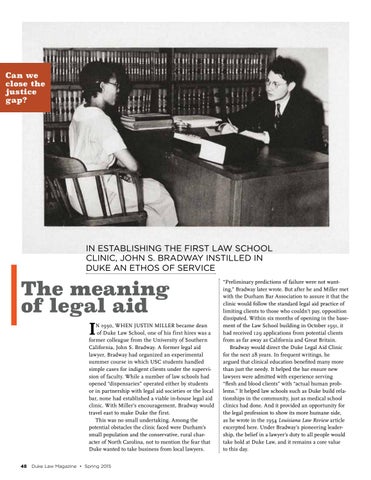Can we close the justice gap?
In establishing the first law school clinic, John S. Bradway instilled in Duke an ethos of Service
The meaning of legal aid I
n 1930, when Justin Miller became dean of Duke Law School, one of his first hires was a former colleague from the University of Southern California, John S. Bradway. A former legal aid lawyer, Bradway had organized an experimental summer course in which USC students handled simple cases for indigent clients under the supervision of faculty. While a number of law schools had opened “dispensaries” operated either by students or in partnership with legal aid societies or the local bar, none had established a viable in-house legal aid clinic. With Miller’s encouragement, Bradway would travel east to make Duke the first. This was no small undertaking. Among the potential obstacles the clinic faced were Durham’s small population and the conservative, rural character of North Carolina, not to mention the fear that Duke wanted to take business from local lawyers. 48
Duke Law Magazine • Spring 2015
“Preliminary predictions of failure were not wanting,” Bradway later wrote. But after he and Miller met with the Durham Bar Association to assure it that the clinic would follow the standard legal aid practice of limiting clients to those who couldn’t pay, opposition dissipated. Within six months of opening in the basement of the Law School building in October 1931, it had received 129 applications from potential clients from as far away as California and Great Britain. Bradway would direct the Duke Legal Aid Clinic for the next 28 years. In frequent writings, he argued that clinical education benefited many more than just the needy. It helped the bar ensure new lawyers were admitted with experience serving “flesh and blood clients” with “actual human problems.” It helped law schools such as Duke build relationships in the community, just as medical school clinics had done. And it provided an opportunity for the legal profession to show its more humane side, as he wrote in the 1954 Louisiana Law Review article excerpted here. Under Bradway’s pioneering leadership, the belief in a lawyer’s duty to all people would take hold at Duke Law, and it remains a core value to this day.
